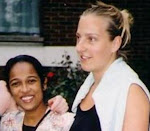I would like to well come Karina Donkers from Australia. She is the 7th volunteer we had for this year from overseas and the 3rd volunteer from Journeys for Climate Justice (JCJ). Just like any other volunteer we invited her to write few blogs for us. Here she wrote..
Sri Lanka is a beautiful and magical place yet has to face
the confronting challenges of a changing climate. I have started my month of
working as a Journeys for Climate Justice volunteer and am blessed with the
opportunity to work along side Kanchana, president of ECO-V and renowned
conservationist. On my first morning in
Sri Lanka we set out to visit an organic farm in a nearby area. Trudy and Sion (friends of Kanchana) who are willing to settle down in Sri lanka after so many year working in Burma also joined with us. We had been
invited to see the progress of the farm, to share knowledge and network with
the workers there. Amongst the workers was a man named Sampath, who had been working
in environment and organic farming in Sri Lanka for 18 years and had produced
11 books about organic farming. Both kanchana and Sampath were UNDP/GEF small grant winners for their projects few years ago. This small group of workers had only had this plot
of land for seven months and had already created an amazing sustainable food
source, which was producing delicious and healthy food, some of which we took
home with us.
 |
| Thushara, Sion, Trudy, Karina and Kanchana walking to the farm |
 |
| Sampath explaining about his organic farm |
Sampath raised the concern of not being able to find
heritage seeds of certain plants as they were not readily available as hybrid
seeds had taken over in the area. Sourcing these seeds is important and also
raises the need for a seed bank. Eventually this organic farm hopes to expand
the availability of hertiage seeds so that they are available for the entire
community.
During
this visit we established a partnership with Sampath where their organic farm
will be used as a place to run workshops and teach Sri Lankan youth about
organic farming. These skills and knowledge need to be passed on to younger
generations so that they are practiced. Through these workshops youth will be
able to grasp the importance of this way of farming and share their knowledge
with their local and wider communities. On
a grassroots level an important part of building resilience to climate change in communities is sharing skills and knowledge.These workshops will not only build
their knowledge and skills but hopefully empower them to become young leaders
in this time of transition.








No comments:
Post a Comment